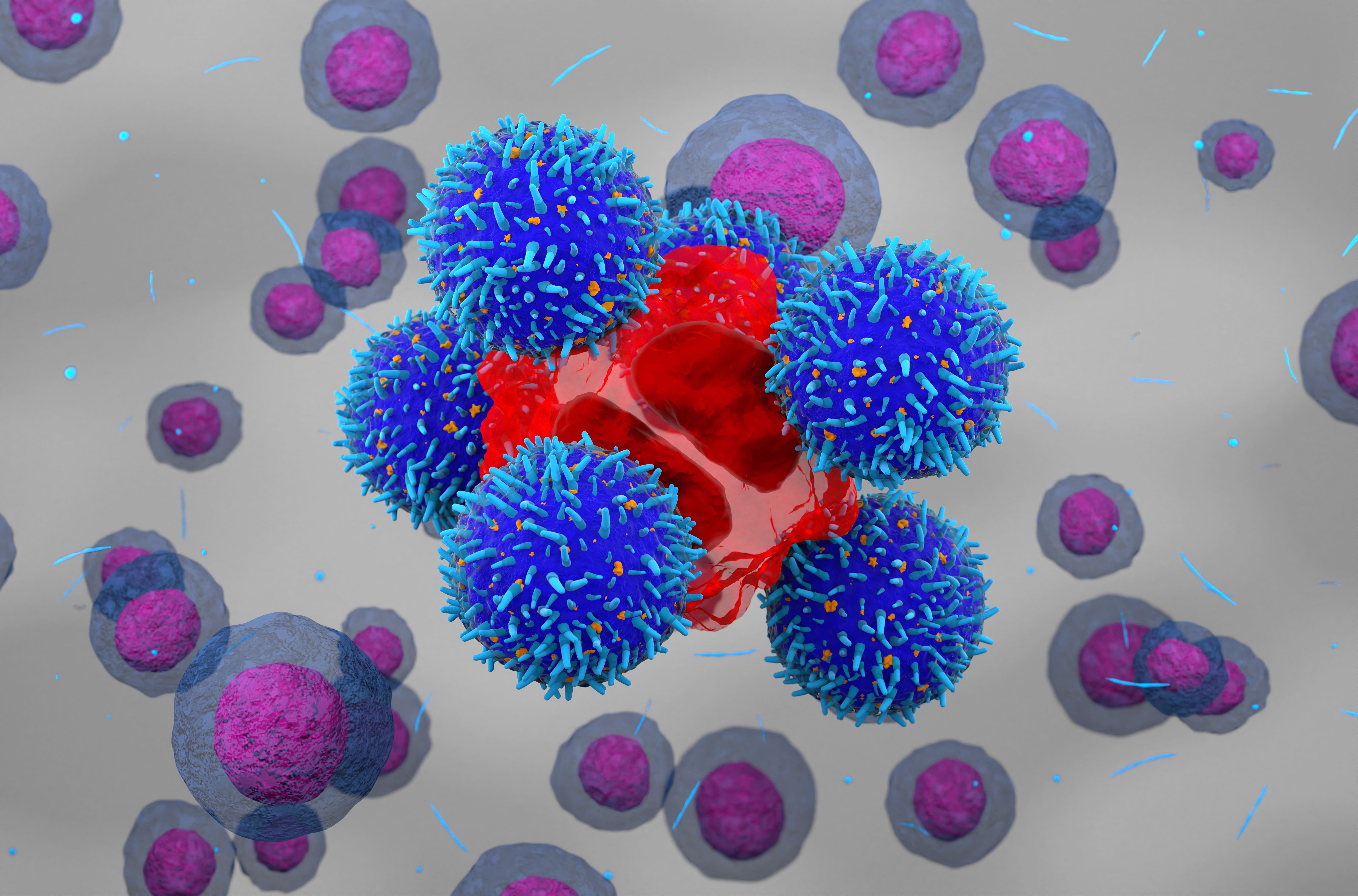- Center on Health Equity & Access
- Clinical
- Health Care Cost
- Health Care Delivery
- Insurance
- Policy
- Technology
- Value-Based Care
Study Suggests CAR T-Cell Therapy Safe, Effective After Allo-SCT in Multiple Myeloma
A retrospective analysis of the CARTITUDE-1 trial suggests that patients who have undergone allogeneic stem cell transplant (allo-SCT) prior to receiving chimeric antigen receptor (CAR) T-cell therapy for multiple myeloma experience comparable outcomes to allo-SCT–naïve patients.
Patients with multiple myeloma who have undergone prior allogeneic stem cell transplant (allo-SCT) showed comparable outcomes to those without prior allo-SCT when treated with ciltacabtagene autoleucel (cilta-cel), a B-cell maturation antigen (BCMA)–directed chimeric antigen receptor (CAR) T-cell therapy, in the phase 1b/2 CARTITUDE-1 trial (NCT03548207), according to a retrospective analysis.1
LASZLO - stock.adobe.com

The findings, published in Clinical Lymphoma, Myeloma, and Leukemia, suggest that cilta-cel may be a feasible treatment option for patients who have undergone allo-SCT in previous lines of therapy for multiple myeloma.
Although autologous stem cell transplant (auto-SCT) using a patient’s own stem cells is the standard of care in multiple myeloma, the role of allo-SCT, which utilizes stem cells from a donor, is not as clearly defined.1,2 The study authors aimed to determine whether prior allo-SCT affects outcomes among patients receiving CAR T-cell therapy for relapsed/refractory (R/R) multiple myeloma because these patients are typically excluded from clinical trials of CAR T-cell therapy.
“In a post–allo-SCT setting, T cells apheresed for manufacturing of the CAR-T product may include an allogeneic donor component, raising a potential concern for exacerbation or restimulation of graft-versus-host disease following infusion of the CAR-T cells,” the authors explained.
In the CARTITUDE-1 study, cilta-cel showed efficacy in heavily pretreated patients with R/R multiple myeloma who had received at least 3 prior lines of therapy. Updated results reported an overall response rate (ORR) of 97.9% (95% CI, 92.7%-99.7%) and a stringent complete response (sCR) rate of 82.5% (95% CI, 73.4%-89.4%) at a median follow-up of 27.7 months in the overall cohort (N = 97). Regarding progression-free survival (PFS) and overall survival (OS), medians were not reached, but the 27-month PFS rate was 54.9% (95% CI, 44.0%-64.6%) and the 27-month OS rate was 70.4% (95% CI, 60.1%-78.6%).3
The retrospective analysis conducted by authors Htut et al compared outcomes among 7 patients who received prior allo-SCT vs 90 patients who had not received allo-SCT prior to CAR T-cell infusion. The prior allo-SCT cohort received a median of 9 (range, 6-14) prior lines of therapy and had a median time since allo-SCT of 5.1 (range, 2.7-6.2) years, and the remaining 90 patients received a median of 5 (range, 3-18) prior lines of therapy.1
At a median follow-up of 27.7 months following treatment, the ORR among those who had received prior allo-SCT was 85.7% (n = 6) and the sCR was 71.4% (n = 5). In the cohort without prior allo-SCT, the ORR was 98.9%. The safety profile was comparable between groups, with 85.7% (n = 6) of patients in the allo-SCT group experiencing cytokine release syndrome (CRS) and 95.6% of those without prior allo-SCT experiencing CRS. Immune effector cell–associated neurotoxicity syndrome occurred in 14.3% and 16.7% of patients in each group, respectively. Two deaths due to adverse events occurred in the prior allo-SCT cohort, with 1 considered treatment related. No cases of GVHD were reported.
While the efficacy and safety were similar between patients with or without prior allo-SCT in CARTITUDE-1, additional studies are needed to confirm the findings and determine the safety and efficacy of CAR T-cell therapy in patients with multiple myeloma who have undergone allo-SCT in prior lines of therapy.
References
1. Htut M, Dhakal B, Cohen AD, et al. Ciltacabtagene autoleucel in patients with prior allogeneic stem cell transplant in the CARTITUDE-1 study. Clin Lymphoma Myeloma Leuk. Published online August 22, 2023. doi:10.1016/j.clml.2023.08.012
2. Types of stem cell and bone marrow transplants. American Cancer Society. Updated May 4, 2023. Accessed August 24, 2023. https://www.cancer.org/cancer/managing-cancer/treatment-types/stem-cell-transplant/types-of-transplants.html
3. Martin T, Usmani SZ, Berdeja JG, et al. Ciltacabtagene autoleucel, an anti-B-cell maturation antigen chimeric antigen receptor T-cell therapy, for relapsed/refractory multiple myeloma: CARTITUDE-1 2-year follow-up. J Clin Oncol. 2023;41(6):1265-1274. doi:10.1200/JCO.22.00842
